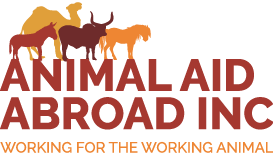Camel Camp in Rajasthan a Huge Success
Thanks to your kind donations, Help in Suffering (HIS) organised a special camp for sick camels during the Nagaur Fair in February. Nagaur is a town in Rajasthan and people gather here during the fair to trade animals including camels and horses. The HIS team at the camp consisted of two vets and five vet assistants.
Arrival of camel carts for the fair
Large gathering of camels
A Rajasthani camel owner in traditional attire
The HIS team treated 417 sick camels during their week-long camp. The most common issues seen were stomach issues and wounds.
Deworming medicine was given to 200 camels, and the vets advised owners to deworm their camels every three months. Some camels were treated for stomach problems like indigestion and diarrhoea, which camels can get from changes to their food or from stress they experience during the fair.
Administering laxatives to treat gut impaction
Intravenous fluid administration to treat diarrhoea
Administering an eye injection
Treating an abscess
The HIS tent surrounded by camels waiting for their turn
Many camels at the fair had wounds, including sores from their saddles or injuries to their noses from harmful nose pegs.
The team worked hard to treat these wounds and taught owners about using safer plastic nose pegs instead of metal or wooden ones. All in all, they treated 178 camels for nose peg wounds and handed out 680 plastic nose pegs to prevent future wounds.
HIS also treated 82 camels for skin infections such as mange, which makes camels very itchy and uncomfortable.
Removing a broken wooden nose peg
Handing out plastic nose pegs to prevent wounds
Treating a leg wound
One owner arrived with a camel who had a very large and deep saddle wound, as well as an extensive maggot-infested wound around his nose. The camel’s wounds were cleaned, then antibiotics and pain killers were administered. Oral medication and antiseptic ointment was also given to the owner.
Camels are often hit and injured on roads, especially at night when they're hard to see.
To address this issue, the team fixed reflectors on 223 camel carts to make them more visible and prevent accidents.
Fixing reflectors to camel carts
During the fair, HIS handed out 600 educational leaflets to teach owners how to take better care of their camels. These leaflets included pictures and simple explanations on topics like wound care, using cart reflectors and keeping camels healthy.
Distributing educational leaflets to owners
Overall, the camel camp was a huge success and hundreds of camels’ lives were improved as a result of HIS’s hard work.
This camel camp was only made possible due to your compassion for working animals. Thank you so much for your ongoing support, which allows our partner groups to provide this essential care for camels and other animals in need.
The Indian government’s animal husbandry department gave HIS a certificate of appreciation

















